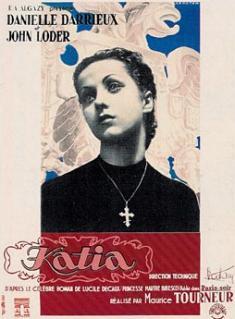| Katia | |
|---|---|
 | |
| Directed by | Maurice Tourneur |
| Written by | Jean-Jacques Bernard Jacques Companéez |
| Produced by | Louis d'Hee |
| Starring | Danielle Darrieux |
| Cinematography | Robert Lefebvre |
| Edited by | Roger Mercanton |
| Music by | Wal Berg |
Production company | |
| Distributed by | Cando-Film (1949) (Austria) Arthur Mayer & Joseph Burstyn (US) |
Release dates |
|
Running time | 89 minutes |
| Country | France |
| Language | French |
Katia is a 1938 French historical drama film starring Danielle Darrieux. The movie was directed by Maurice Tourneur, based on novel Princesse Mathe Bibesco by Marthe Bibesco under the pseudonym Lucile Decaux. It tells the love affair of Russian princess and Czar Alexander II.
Contents
It was remade in 1959 with the same title, which starred Romy Schneider.[ citation needed ]